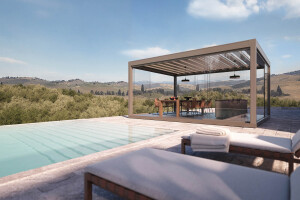Opened in 1894, Massey Music Hall has been Toronto’s national stage for some of the world’s greatest classical, jazz and new world music performers.
Etched in the psyche of both the country and the City, Massey Hall has survived with very limited patron, artist and performance support spaces for over a century. Triggered by a recent donation of land, this project represents the full transformation and revitalization of the heritage hall and includes a new addition. Exterior passarelles will connect the balcony levels to new patron amenities as well as a second performance space on the acquired land to the south.


Revitalization of an Icon: The Hall, revered for its intimacy (even at 2800 seats) and its acoustics, will be sensitively updated to meet current standards of accessibility, incorporate the addition of a parterre at orchestra level to mirror the balconies above; include mechanized removable seating to allow for General Admission, a full upgrade of audio and lighting technology, and improved artist accommodation. The interior materials palette, a mix of the original Moorish-style and a Deco overlay will be carefully reconsidered as the original stained glass windows are reintroduced to the hall. Stage acoustics will also be upgraded to support performers on stage.


Key heritage elements preserved
To help various teams working on the project, GBCA, working alongside lead architects KPMB, designed a conservation strategy that became the guiding map for revitalizing the 128-year-old Hall. The goal of the project was to undertake much needed improvements to the Hall, while protecting the original building’s key heritage elements.


Decorative plaster ceiling
The most dramatic and challenging repair of the project was the decorative plaster ceiling. Covered with wire mesh over the last 50 years, the ceiling’s plaster was restored, where select portions of the plaster were removed and acoustical plaster was introduced to improve the Hall’s acoustics.


Art Nouveau-styled stained glass windows
Another notable conservation initiative was restoring the Art Nouveau-styled stained glass windows. Close to 100 multi-coloured windows, which were blocked off over the years, were uncovered and restored, including the windows with the 12 portraits of famous composers on the ground floor.


Balcony, seats, and cast-iron column
To conserve the overall layout of the auditorium, the original balcony and gallery, supported on cast-iron columns, were maintained. While new seats replaced the old ones, the original wood balcony fronts and metal railings in the Hall were conserved.


Art Deco lobby
When it came to the Hall’s lobby, originally renovated in the 1930s in a complete Art Deco style, all its elements were preserved and maintained, despite visual inconsistencies with the Hall’s Victorian interior. Be it the terrazzo flooring, the marble surrounds, the ceilings or the walls, each heritage element added a layer of history to the Hall and was thus preserved.


Palladian exterior
On the Hall’s Palladian exterior, the fire escapes, which were part of the original design, were removed only to reveal more important heritage elements that lay underneath. The red Don Valley bricks were repaired and window openings were altered, while the iconic mid-century neon sign reading ‘Massey Music Hall’ was repaired and reinstalled.
In its role as heritage consultant to the Hall for more than a decade, GBCA was successful in preserving the mixed-design elements of the project, the complexities of which initially seemed insurmountable.
“We are grateful to GBCA for the pivotal role they played in our restoration of Massey Hall, one of the country’s most cherished heritage assets, ensuring it will continue to make history one concert at a time for future generations,” says Grant Troop, Vice President of Operations at The Corporation of Massey Hall and Roy Thomson Hall. “We are delighted for the widespread acclaim that GBCA, and the local skilled artisans who worked alongside them, have received in restoring the beauty of the original hall. The entire design and construction team shares in this praise for respecting the architecture of the original hall, while at the same time modernizing the way it connects with patrons.”

Team:
GBCA: Heritage Architects
KPMB Architects: Architecture and Interior Design
Eve Guinan – CAHP*, Eve Guinan Design Restoration: Stained Glass
John Wilcox – CAHP, Vitreous Glassworks: Stained Glass
Jean-Francois Furieri – CAHP
Iconoplast Designs Inc.: Plaster Restoration
Eric Stewart – CAHP, Historic Plaster Conservation Services: Plaster Restoration - Assessment
Fiona Graham – CAHP: Conservator
Sam Trigila – CAHP, Clifford Restoration: Heritage Contractor
Charcoalblue: theatre
Sound Space Vision: acoustics
Goldsmith Borgal & Company Ltd. Architects: heritage
Entuitive: structural, building envelope
The Mitchell Partnership Inc.: mechanical
Crossey Engineering Ltd.: electrical, security and I.T.
Martin Conboy Lighting Design: architectural lighting
Bhandari Plater: signage & graphics
Engineering Harmonics Inc.: audio visual
LRI: code / fire and life safety
NAK Design Group: landscape
Anjinnov Management: food services
BA Consulting Group Ltd.: transportation
Tucker Hirise: phase 1 construction management
EllisDon: phase 2 construction management
Turner & Townsend: project management + cost consultant
Reich & Petch: exhibit design
Total Opening Consultants: hardware
Probel: façade access systems
WSP: civil engineering

KPMB Team:
Marianne McKenna: partner-in-charge
Chris Couse: founding principal
Graham Baxter: senior associate, phase 2b
Matthew Wilson: senior associate, phase 2b + 2a
Carolyn Lee: senior associate, interiors
Clementine Chang: associate, project architect, phase 2b
Nic Green: associate, phase 1 + 2b
Meika McCunn: associate, phase 1 + 2b
Andrea Macaroun: associate, phase 1
Ramin Yamin, Ping Pai, Victor Garzon, David Poloway, Mahtab Gashghaii, Klaudia Lengyel, Geoffrey Turnbull, Nonna Shabanova, Arian Hussainzada, Danielle Whitely, Gill Baldwin, Ramon Janer, Shivathmikha Kumar, Ali Salama, Amal Dirie, Olivia Di Felice, Andrew Barat, Victoria Ngai











































